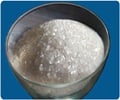According to a recent study, rinsing your mouth with a glucose-laden drink can improve your self-control.

The first task, which has shown to deplete self-control, was the meticulous crossing out of Es on a page from a statistics book. Then, participants performed what is known as the Stroop task where they were asked to identify the colour of various words flashed on a screen, which spell out the names of other colours.
The Stroop task's goal is to turn off the student's tendency to read the words and instead see the colours.
Half of the students rinsed their mouths with lemonade sweetened with sugar while performing the Stroop test, the other half with Splenda-sweetened lemonade. Students, who rinsed with sugar, rather than artificial sweetener, were significantly faster at responding to the colour rather than the word.
"Researchers used to think you had to drink the glucose and get it into your body to give you the energy to (have) self control. After this trial, it seems that glucose stimulates the simple carbohydrate sensors on the tongue. This, in turn, signals the motivational centres of the brain where our self-related goals are represented. These signals tell your body to pay attention," said University of Georgia professor of psychology Leonard Martin, co-author of the study.
It took subjects about 3-5 minutes to perform the Stroop test. Martin said results show a measure of self-control, but a glucose mouthwash might not be enough to solve some of the biggest self-control obstacles like losing weight or smoking.
Martin, in collaboration with co-author Matthew Sanders, a doctoral candidate also in the UGA Franklin College of Arts and Sciences, believes the motivation comes in the form of self-values, or emotive investment.
Martin's research focused on what the affects of swishing glucose psychologically rather than physiologically. "We think it makes your self-related goals come to mind," he said.
Martin's lab is continuing to study how subjects evoke and interpret emotive responses.
The finding was published in Psychological Science.
Source-ANI
 MEDINDIA
MEDINDIA




 Email
Email






